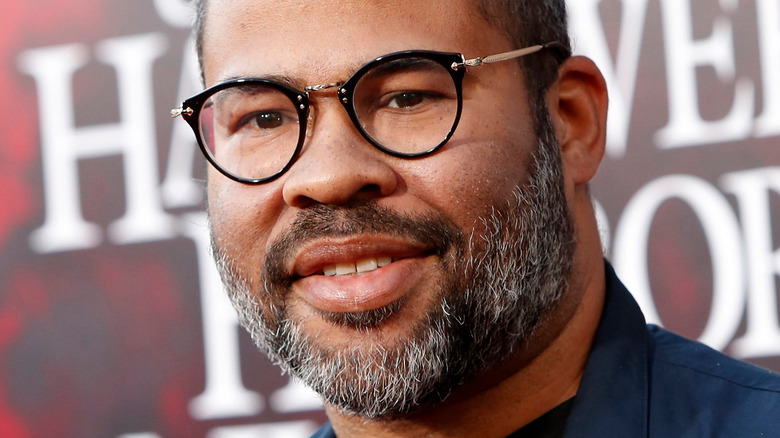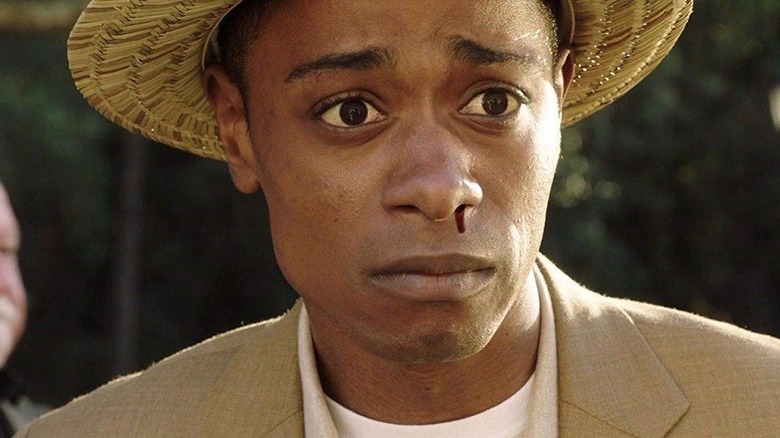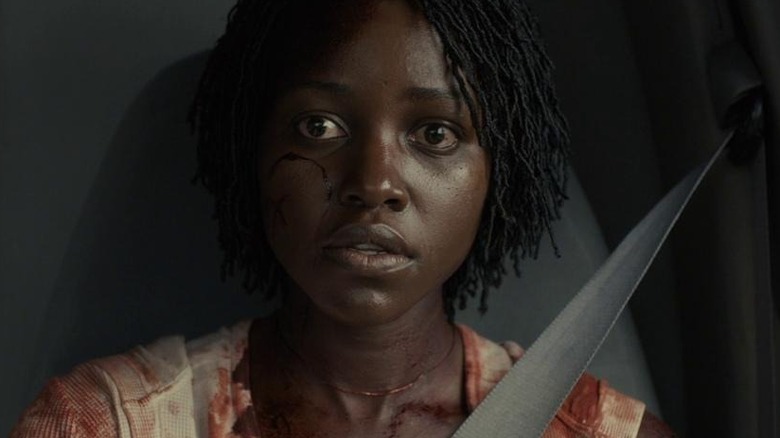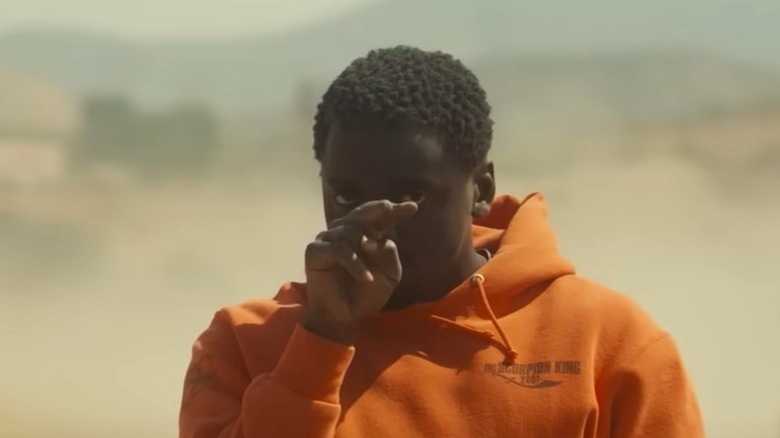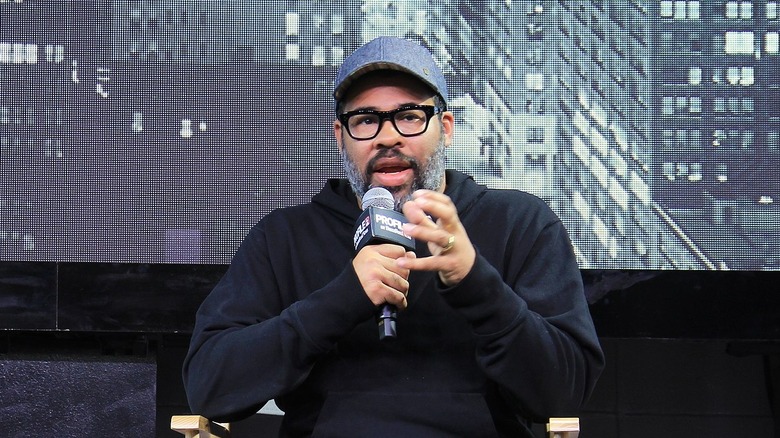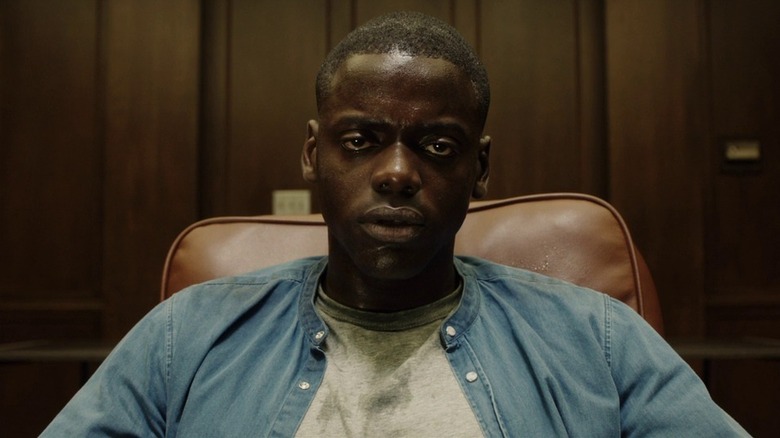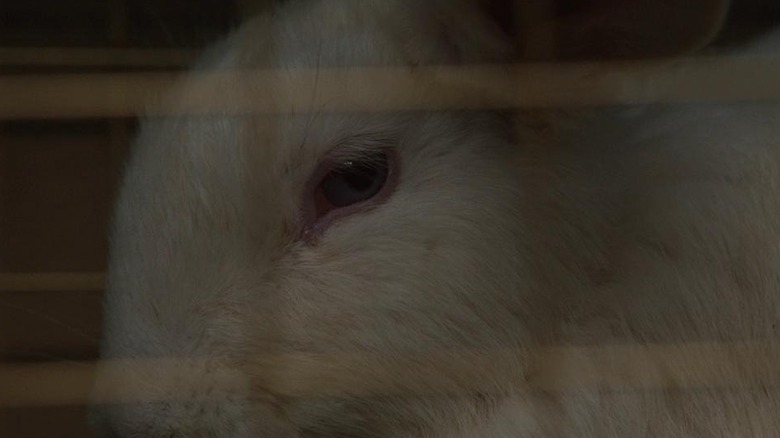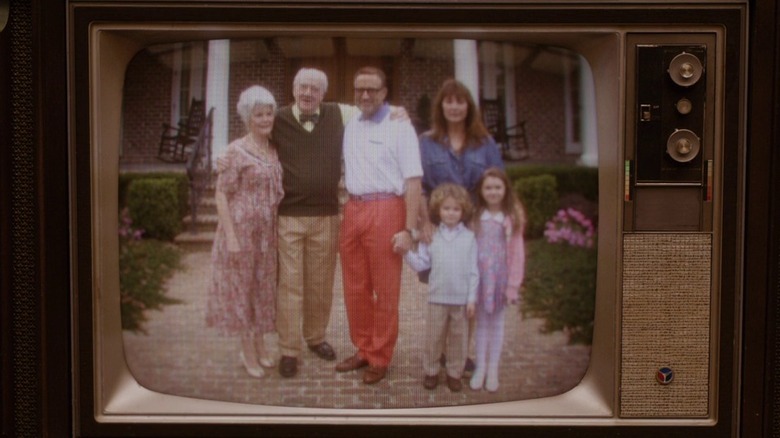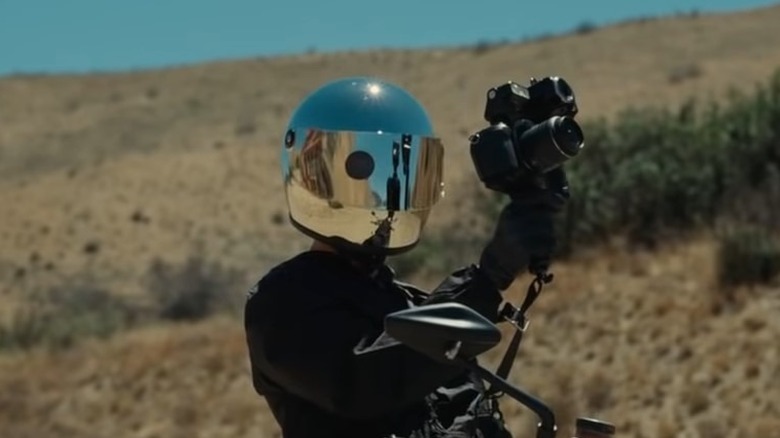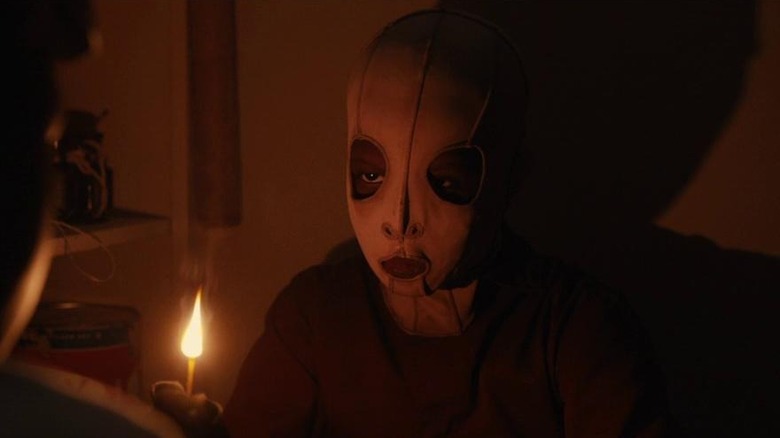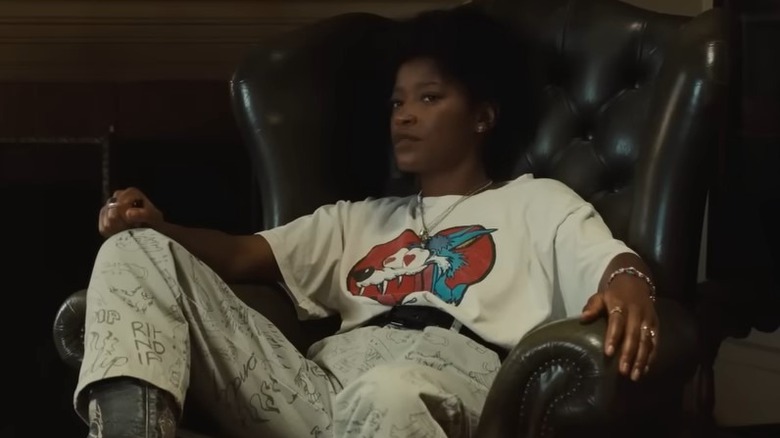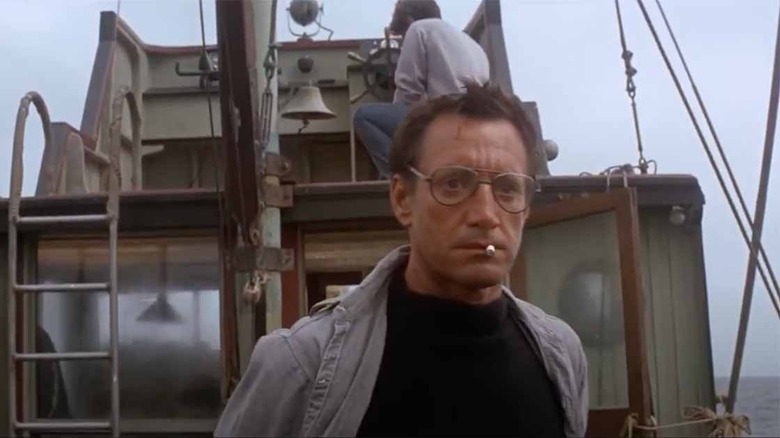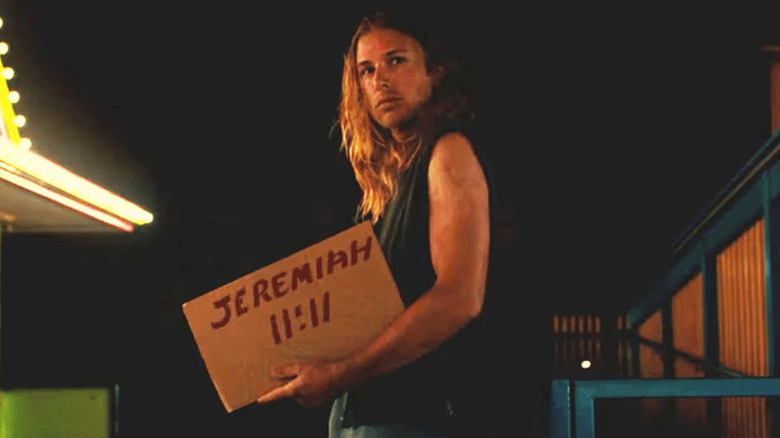Things That Happen In Every Jordan Peele Movie
Through his first three films as a director, Jordan Peele has developed a signature style that has kept audiences on their toes when they're not glued to the seats in fear. The Oscar winner has established himself as a socially conscious master of horror whose films simultaneously thrill the brain while making the heart skip a beat or two.
Peele, who also writes his films, started his career in small roles on TV and in film. Back then, he was known for his comedy chops on shows such as "MADtv" and "Key and Peele," which he co-created with fellow "MADtv" alum Keegan-Michael Key. In 2016, the two made the comedy film "Keanu," which Peele co-wrote but didn't direct. Then Peele took a hard but welcome turn to horror with 2017's "Get Out." It grossed $255 million on a budget of just $4.5 million. Since then, he's written and directed 2019's "Us" and 2022's "Nope," establishing himself as a new horror master.
All of Peele's films contain Easter eggs (such as the scissors on Ricky Park's desk in "Nope" being the same ones from "Us"), but there are also things that happen in every single Jordan Peele movie. Read on to find out more. Note: Spoilers are everywhere!
The film titles are symbolic
Jordan Peele is a meticulous filmmaker who chooses film titles that serve as both a simple name and a thematic metaphor. For example, Peele says in the "Get Out" director's commentary that the title "conjures" Eddie Murphy's routine from 1983's "Delirious." Murphy jokes that if a ghost said "get out" to a Black person, they'd immediately leave. Both Rod (Lil Rel Howery) and Andre/Logan (LaKeith Stanfield) tell Chris (Daniel Kaluuya) at different points he needs to get out of his girlfriend's house. The title also references sundown towns found all over America, where signs warned Black people to get out before nightfall.
There's also a double meaning to "Us." It refers to both the haves and the have nots, i.e., the above-ground dwellers such as Adelaide (Lupita Nyong'o) and the underground-dwelling Tethered like Red (also Nyong'o). It also stands for the United States. According to Polygon, Peele told the crowd at SXSW 2019, "This movie is about this country." Indeed, Red responds "We are Americans" when asked who her family is.
The title "Nope" is similar to "Get Out," in that its horror would make Black audiences say "nope!" According to Vulture, Peele said at CinemaCon that he likes "titles in tune with how audiences are feeling and thinking inside the theater." He further noted that this is especially true for Black audiences: "We love horror but there's a skepticism. You ain't gonna scare me — nope!"
There's a twist
While the focus of a Jordan Peele film is not a twist per se, that doesn't mean Peele can't add misdirection so when the film's theme is fully revealed, it hits harder.
In "Get Out," Chris is nervous about meeting his girlfriend Rose Armitage's (Allison Williams) family, revealing their interracial relationship. Her father Dean (Bradley Whitford) makes some awkward jokes, but Chris, with Rose's encouragement, brushes it aside. Before long, Chris discovers the awful truth: The Armitages trap Black men and women, then sell them to their white friends as vessels for a "transformation."
The doppelgänger version of the Wilson family in "Us" presents a new wrinkle in twists because everyone in the film has a clone, the "Tethered." As a child, Adelaide had a traumatic meeting with hers. It appears adult Adelaide wants to protect her family from the Tethered, but there's a more insidious reason for her behavior. A flashback reveals that the clone, Red, is the original Adelaide. It's a gut-punch that the film has us rooting for someone we assume is heroic.
The Haywood siblings of "Nope" discover a UFO near their ranch. They want to photograph it, make bank, and save their business. When Ricky Park hosts a new show at Jupiter's Claim, the UFO attacks, sucking up Ricky, his family, and his guests. But they're not being abducted, they're being swallowed — this UFO is not a ship, but a living creature. It's one of the most horrifying reveals in recent memory.
Looking/watching is important
In all of Jordan Peele's films, looking/watching is important. In "Get Out," Georgina (Betty Gabriel), the Armitage family maid, spends a lot of time looking in the mirror. We learn why much later –- she's Rose's grandmother transplanted into another woman's body. As noted by The Atlantic, Chris is a photographer, which involves looking and framing. His camera is the tool that starts the unraveling of the Armitage family's plan, as a camera flash shakes Logan out of the Sunken Place long enough to warn Chris to "Get out!"
In "Us," the Tethered are trapped underground, unseen. They first appear watching the Wilson family. Rabbits also live underground with the Tethered. As Peele told BBC News, he's afraid of rabbits: "They're very cuddly but they also have a sociopathic expression, and they kind of look past you in a creepy kind of way." Peele uses close-ups of the rabbits' eyes to promote an uncanny feeling, and the Tethered have that same creepy way of looking at their originals.
"Nope" uses the act of looking most explicitly. As Ricky Park says in the film, "You are about to witness an absolute spectacle." He thinks it will be revealing Jean Jacket, the creature everyone else has mistaken for a flying saucer. OJ (Daniel Kaluuya), however, realizes that if you look directly at Jean Jacket, it will attack you. OJ and Em (Keke Palmer) also set up cameras everywhere to get a photo of Jean Jacket. Looking in "Nope" is as much about seeing spectacle as it is surveilling it.
Peele cameos in his own films
Following in the footsteps of other masters of horror such as Alfred Hitchcock, who famously cameoed in his own films, Jordan Peele also makes appearances in his movies. You don't see him, a la Hitchcock, but you hear him: Peele provides both narration and the sounds of dying animals.
On the IMDb cast list for "Get Out," Peele is "uncredited" as the voice of "Dying deer/UNCF PSA Narrator." Peele himself confirmed the PSA narration in a tweet in 2017. In "Us," Peele voices both a dying rabbit –- which is hilarious, given how much he says he fears them –- and the Fun House Narrator at the pier attraction where Adelaide and Red first meet. Peele can also be heard in "Nope" as one of the people interviewed in a television clip that plays in the background.
Given Peele's work as a voice actor in fare such as "Robot Chicken," "Rick and Morty," "American Dad!," and, rather ironically, as Bunny in "Toy Story 4," it's not a surprise he'd choose this method of being in his own movies.
The protagonists have trauma
Horror films have a long tradition of protagonists with traumatic backgrounds, and Jordan Peele's films all follow this pattern. In "Get Out," Chris initially seems like a fairly happy guy. He has a (seemingly) great relationship and a thriving photography career. It turns out, though, that his mom died in a hit-and-run accident when he was young. The trauma informs his reaction to the deer he and Rose accidentally hit on their trip to her parents' house and everything after.
In "Us," the young Adelaide goes into a funhouse at the pier and meets her doppelgänger, which (seemingly) causes her to become withdrawn and silent. Of course, it's not that Adelaide has become withdrawn, it's that her double (who attacks her and takes her place) doesn't know how to speak or interact with non-clones. Red (the original Adelaide) is deeply traumatized when her doppelgänger damages her larynx and traps her underground.
The three main characters in "Nope" all have trauma. OJ and Em lose their father when his skull is pierced by a falling nickel, mortally wounding him. Ricky turns out to be the child star who was terrorized when Gordy the chimpanzee ran wild on the set of "Gordy's Home!" Instead of processing the trauma, Ricky represses it, resulting in a horrifying end.
Animals are thematically important
Animals play a thematically resonant role in all of Jordan Peele's films. Deer are important symbols in "Get Out," from the one Rose and Chris accidentally hit as they drive to her parents' house, to the deer head mounted on her parents' wall. Chris relates the first deer to his mother being killed in a hit-and-run accident. His helpless feeling watching that deer comes back later in the film when he accidentally hits Georgina with a car. He decides to help her — but she attacks him for his efforts. Male African slaves were also referred to as "bucks" (per CNN), a theme that plays out when the Armitages and their party guests size Chris up like a piece of meat.
Rabbits appear in "Us" as the main food source of the Tethered, probably leftover from the same experiments that resulted in their creation. As Peele told The Guardian, rabbits are "an animal of duality. They're adorable but they terrify me at the same time. And they got those scissor-like ears that creep me out." Scissors are the main weapon of the Tethered. Rabbits also figure briefly into "Get Out," as Jeremy is playing a song about hunting rabbits — "Run, Rabbit, Run" — in his car prior to kidnapping Andre.
The main animals in "Nope" are the horses at the Haywood ranch and Gordy the chimpanzee. Both the horses and Gordy represent the mistreatment/misunderstanding of animals in Hollywood. They appear tame, but can still be wild. One horse nearly kicks Bonnie (Donna Mills) when startled, while Gordy rampages after a popped balloon startles him. Both tie in to Jean Jacket, the "UFO," which Ricky mistakenly thinks he can control.
Important plot details are revealed via videotape or television
In horror and suspense films, information is often withheld until it's crucial for the protagonist to discover. Jordan Peele usually doles his films' critical information out via videotape or television broadcasts. In "Get Out," Chris is hypnotized and tied to a chair in a basement. He is forced to watch a video explaining the transformation he will undergo, and what the Order of the Coagula is. Only then does he realize the extent of the danger he is in.
"Us" uses video commercials for Hands Across America, a charity event in 1986 that aimed to raise money for Africa. The event is critical because it's one of the last things the original Adelaide remembers from the time before she was trapped underground by her doppelgänger. The Wilson family clones first appear holding hands, and when the rest of the Tethered take revenge on the world that has kept them trapped, they recreate Hands Across America in a twisted event of their own. The video ties in thematically because the Tethered are tied to their originals via their souls and cannot help but imitate them.
In "Nope," the scariest event begins via video as we see glimpses of a fictional 90's sitcom starring Ricky when he was a child. The perspective then shifts to flashback as Ricky remembers what happened on that awful day, which ties into both his fate and the themes of the film as a whole. Peele subsequently released an intro for "Gordy's Home!" on what looks like distressed VHS via his Twitter account.
A character wears a distinctive costume that hides or obscures their face
Another thing that happens in all Jordan Peele's films is a character showing up with their face completely covered or otherwise obscured. This trope is used thematically and to hide critical information from both the other characters and the audience.
Rose's brother Jeremy (Caleb Landry Jones) in "Get Out" is abrasive and unpleasant. It's not revealed until later that Jeremy kidnapped Andre because in that scene, he's wearing a black knight's helmet hiding his whole head. Chris later sees the helmet in Jeremy's car and the audience realizes who took Andre. Also, in the director's commentary for "Get Out," Peele says it's a Knights Templar helmet, and that he thought up a whole mythology for it tied to the Holy Grail and the pursuit of immortality.
Both Jason and his doppelgänger Pluto wear masks in "Us." Jason puts his on to hide, but is frequently seen without it. Pluto, however, always has his on, obscuring his face. What he's hiding is scarring from playing with fire: Jason is shown trying to learn a fire trick, and Pluto, whose actions are controlled by Jason, got burned as a result. It's awful and sad because Pluto never had a choice.
When Em, OJ, Antlers, and Angel are trying to get filmed evidence that Jean Jacket exists in "Nope," an interloper shows up on a motorcycle and hinders their plan. The newcomer's helmet is a shiny orb that covers the whole head. The helmet is reminiscent of the VFX orb earlier in the movie that spooked Lucky the horse. The stranger (who turns out to be a reporter from TMZ) gets eaten before we can see who they are.
Othering plays an important thematic role in Peele's social criticism
One of Jordan Peele's major themes throughout all his films is the Other. As noted by The Ethics Center, the concept of the Other is used to show "the ways other people are different from us." By "Othering," "we turn fellow humans into abstract entities we can distance ourselves from or treat as less-than-human." Race is used by the Armitage family and their white friends in "Get Out" to Other Chris and all Black people into pernicious stereotypes. The Armitages have no guilt whatsoever in using their victims' bodies to achieve a warped type of immortality. Chris doesn't exist as a person to them — he's just a vessel they sell to the highest bidder.
While it seems the Tethered in "Us" are Othered by race because we first see them attack the Wilsons, it turns out to be more about class. Even the white Tylers have doppelgängers. The Tethered are literally the underclass because they exist in abandoned underground facilities. That they can only mimic their originals versus having their own autonomy allows their creators to treat them terribly.
The Others in "Nope" are more symbolic because they're animals (horses, chimpanzees, and whatever Jean Jacket is). They stand in for the human crew of a film, the "below the line" workers considered easily replaceable. In filmmaking parlance, "below the line" means anyone not on the creative side of the process, according to StudioBinder. The way the animals are treated extends to the way some human crew are treated as disposable. Peele appears to be criticizing the treatment not just of animals on film sets, but of anyone considered "less than."
Peele even thinks of costuming to promote his film's themes
Another thing Jordan Peele puts in all his films is carefully considered costuming. Of course, most filmmakers are concerned with good costuming, but Peele seems to have a particular fondness for t-shirts. Speaking to Vogue, costume designer Nadine Hader revealed that she worked closely with Peele to get all the character costumes just right in "Get Out." In addition to the All-American looks on Rose, there's Chris' gray and chambray blue outfits, but especially his gray t-shirt. Gray is neutral, meaning Chris could be whoever his captors want him to be -– including transforming him into blind white gallery owner Jim (Stephen Root).
In "Us" and "Nope" the t-shirts become more vibrant, particularly with logos of bands and old movies. Peele told The New York Times that the shirts represent "the identity, the outward-facing branding that we present to the world." He also used them for "Easter eggs and coincidences" as well. In "Us," Jason wears a "Jaws" shirt on the beach, which has all kinds of connotations in that setting, and Zora is seen in a rabbit shirt. There's also a Black Flag band tee, tying into Jeremiah 11:11.
The band shirts in "Nope" include the Jesus Lizard one Angel gives to Em when she and OJ stay with him, as well as shirts from Mr. Bungle, the Wipers, and Rage Against the Machine. Costume designer Alex Bovaird told Variety that she chose the shirts because Brandon Perea (Angel) is "naturally upbeat" and they wanted the character to be "a bit more depressing."
He layers in references to other horror films
To list all the film references Jordan Peele puts in his films would take too long, so we'll highlight a few favorites. As noted in the director's commentary for "Get Out," Peele says he stole the style of the film's credits from Stanley Kubrick's "The Shining" (1980). The style is also used in the titles for the Order of the Coagula video Chris is forced to watch (forced watching of videos also references Kubrick's 1971 film, "A Clockwork Orange"). "Jaws" (1975) is an influence in the way the car stalks Andre in the beginning of the film, with "Halloween" (1978) also influencing the creepy setting and vibe of that scene.
"Jaws" appears again in "Us" when Jason wears a "Jaws" shirt at the beach. Peele told The New York Times that "Jaws" is the "perfect representation of the theme of darkness rising from below, a shadow that can't be seen at first but is imminent." Additionally, when young (original) Adelaide is watching TV, there are VHS tapes next to the set, including one for "C.H.U.D." (1984), which is about Cannibalistic Humanoid Underground Dwellers, foreshadowing the Tethered.
"Nope" has a visually neat reference to the beloved and influential anime "Akira" (1988) when Em does "the Akira slide" on a motorcycle. "Jaws" once again crops up as a reference in the way the film is structured and in the mysterious nature of Jean Jacket until we finally see it open its mouth. There are plenty more films referenced in "Nope."
Each film has a targeted religious reference
Religious references pop up in every film Jordan Peele has written and directed, though in "Get Out," the reference didn't quite make it on to the screen. Still, Bible verses play an important part in Peele's movies.
The beginning of the script for "Get Out" quotes Romans 12:1-2, which says, in part, "I appeal to you therefore, brothers, by the mercies of God, to present your bodies as a living sacrifice," which is exactly what the Armitages want from Chris and other Black men. The verse further says, "Do not be conformed to this world, but be transformed by the renewal of your mind," which mirrors the Order of the Coagula's twisted "mission."
In "Us," a man at the beach carries a sign that says "Jeremiah 11:11." Apart from the symmetry of the two elevens symbolizing humanity and their Tethered clones, the verse also says that God will not only "bring evil upon them," but He also won't help the afflicted despite their cries. This plays out in the film, as only the Tethered can save themselves from their underground hell.
"Nope" opens with Nahum 3:6, which states, "I will cast abominable filth upon you, make you vile, and make you a spectacle." Not only does Jean Jacket rain down nickels, keys, and other detritus it doesn't like to eat, but it rains blood on OJ and Em's house. Jean Jacket is arguably the biggest spectacle of the entire film, yet it's not vile -– it's just an animal. But Ricky, Antlers, and the TMZ reporter, among others, become "vile" in their addiction to spectacle, and it costs them greatly.
